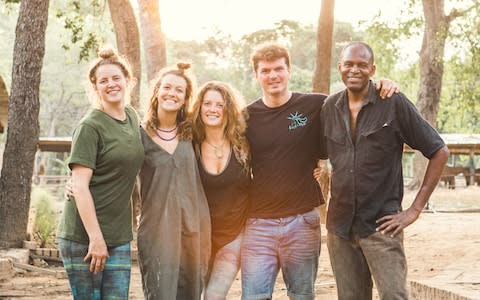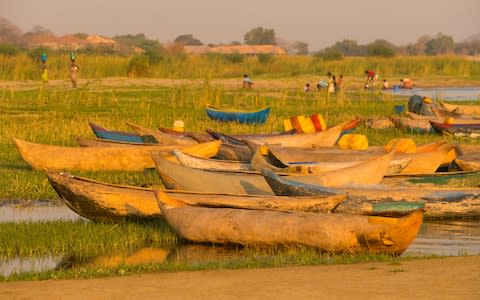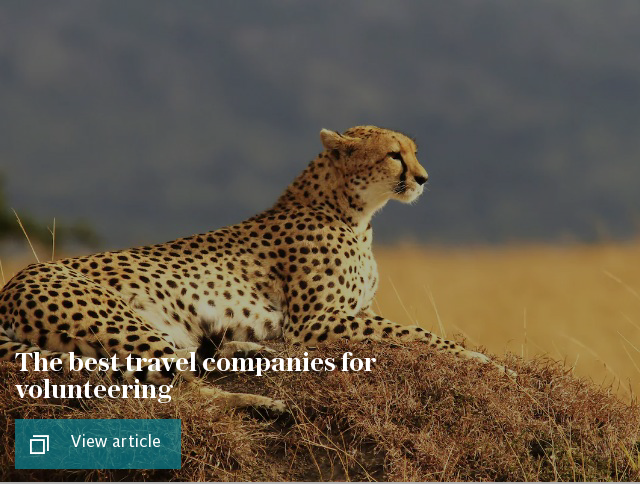Voluntourism in Malawi: Can horse power can make a better world?

You’d never do anything if you thought about it too much,” says my host Frankie Pizzolon over a cup of tea in the dappled shade of the farmhouse courtyard. After a very African journey across Malawi, I feel the same. But she’s talking about having bought Kande Horse, a 60-acre ranch complete with 15 horses located on the shores of Lake Malawi, where I am to spend a week volunteering.
As I arrive, guests and family are gathered around a long table in the yard outside the farmhouse – a brick building that has been added to over time – eating a breakfast of rich yellow eggs served with soft white bread. There’s fresh fruit piled high on the table – it’s mango season – alongside banana and raw cacao smoothies. Several small children chase ducks, dogs sprawl in patches of shade, and the horses – glossy bay and chestnut thoroughbred crosses and Basotho ponies – stamp and snort for attention in the open-sided stables opposite.

Disillusioned with life back home, Frankie came to Malawi to spend time working with her oldest friends, Alice and Nina Pulford. “Their dad is my godfather; we had Saturday jobs in stables together,” she explains. Alice and Nina founded an orphanage in Malawi 10 years ago, which grew into Love Support Unite (LSU), a sustainable model to lift communities out of poverty.
“When you spend time in Malawi,” says Alice, while serving breakfast, “you realise people don’t need charity, but support.” They raise money for LSU through the sale of Love Specs, fun festival glasses that make wearers see rainbow hearts (available at lovespecs.org, from £10). “We want to see a world filled with love, so it’s the perfect message for us.”
Frankie continues: “Just before I was due to go home, Alice and Nina arranged a day riding here at Kande Horse as a surprise. We were having lunch after the ride and daydreaming about all the magical things we could do if we owned it. The manager overheard and told us it was for sale. We had some money put aside for a deposit for a flat in London. But somehow one thing led to another and we ended up making an offer on the ranch! We weren’t looking for a business, let alone 15 horses, a guesthouse and a 60-acre ranch!”

That was in October 2015, and the girls – with help from partners and friends – have spent the past two years loving Kande Horse back to life. “Of course we didn’t realise that nothing really worked, or know anything about the challenge of keeping horses in Africa,” says Frankie. “Or that monkeys would keep eating our pumpkins.” Today people come as guests or, for a smaller fee to cover board and food, volunteers. But everyone receives the same warm welcome.
The guesthouse has had a makeover – wood-panelled bedrooms are trimmed with local textiles. And for volunteers there’s a simple but stylish dormitory as well as bell tents. The girls are working towards creating a sustainable farm and tree nursery, where herbs, fruit and vegetables are harvested seasonally. Guavas, mango, passion fruit, pumpkin, tomatoes, tamarind and cashews end up in meals prepared in the kitchen by Amos the chef. And they’ve just hosted a yoga and wellness retreat, too.
Sleeping in bell tents at the back of the farmhouse means that the day starts when the rooster crows at 5am. In the yard, a soft golden light diffuses the stillness, and Mr Finnigan the cat sits atop a fence post surveying his empire. The grooms begin to arrive at 6am, Nina’s small son Indie totters about collecting eggs, and the ranch stretches into life.

I shadow Christopher, who has worked at Kande since long before the girls arrived. I’m volunteering with the horses, which includes working in the stables, grooming and general welfare, as well as exercising and riding them, so good equine knowledge is required and it’s not suitable for novice riders. But, as Frankie explains, they are careful not to let volunteers take work from local grooms, of whom they employ seven.
You don’t have to be horsey to volunteer here, though. Ben – the other volunteer at Kande during my stay – has been here for three weeks, and not touched a horse. He’s been busy building an outdoor bath and wellness centre where Alice will one day offer massages. Previously Jodie, an artist and signwriter, designed a sign for the driveway; someone else built an outdoor pizza oven. Here, volunteering is what you make of it.
We ride out early, before the sun is fully in the sky. Christopher and I talk about the difference the girls have made to the ranch: on his day off he farms maize and rice, thanks to a loan from Kande. The horses bounce along at a lively pace, throwing up clouds of red dust. There are several treks around the property, through the butterfly and bird-filled forest, or through marshland to the beach. I prefer the latter because we pass villages and schools, giving us an insight into local life. Families cook together outside, children play and everywhere, there is music.

Best of all is the gallop as we approach the beach, and the ride along the glorious shore of Lake Malawi. Life here is lived on the lake. There are no sunbathers, but instead families wash themselves and their clothes in the early morning sun. We ride our horses to the wooded area at the back of the beach and dismount, removing their saddles. Then we ride the horses bareback into the lake to cool them down, and drink, and swim.
Each day is different here. There’s plenty of time to swing in shady hammocks, or read, or help in the garden or the kitchen. Often we head to Kande Beach in the early evening, for a swim and a sundowner before dinner. Life revolves around three communal meals a day, and then everyone goes off to do their own thing. “We want the volunteers here to feel part of the family,” says Frankie. “And although there is a list of basic tasks, as long as everyone gets stuck in and is part of the community, we don’t mind what they do. Even better if they come up with their own ideas.”
I’m there in November, and the rains are coming. It’s known as green season in Malawi and means an abundance of fruit and vegetables, the river beds slick with water. But most people here live under grass roofs, and for them it can mean leaks, and sometimes sickness. Following the ethos of LSU, Kande Horse has started putting tin on the houses of all their staff. “I can’t work out if that makes us bad business women or a business with really good social responsibility,” says Nina.

In the village, William – a builder employed by Kande Horse – is hard at work putting a roof on Amos’s new house with the help of volunteer Ben. “Unless you are prepared to help people make their own journey better, you’ll never find the answer, no matter how much yoga you do,” Alice says.
In Malawi, electricity is a bit hit and miss – for everyone – but candlelight adds to the magic. One evening we eat snuggled on deep sofas in the semi-dark in the living room, eating chunky tomato soup from the garden, with hunks of homemade nut bread and sweet potato chips with mango dip. No internet means proper conversation, tale trading and togetherness. We head to bed with candles in bottles. It’s only 9pm but it feels like we’ve been up past midnight.
Life here is an adventure. On our fourth afternoon, after a morning spent collecting banner grass, we are covered in scratches and have slightly sunburnt skin. But Frankie is bubbling with excitement: she’s arranged a barbecue on the beach, so she can show us the new land they’ve bought.

We head down in a convoy of battered pickup trucks. It’s always a surprise that here, in the heart of Africa, in landlocked Malawi, is a beach with sand dunes, and water gently lapping at the shore. Eventually they’ll build a small bar here for sunset drinks, and huts along the shore that guests can rent. Perhaps there will be kayaks and paddleboards. For now those are dreams, and it’s completely undeveloped. Ten of us sit around a fire, eating grilled steak sandwiches with mango chutney and hot sauce, under the wide African sky. Across the lake the full moon is rising, above us we spot a shooting star, and anything seems possible.
The essentials
Volunteer
A normal stint volunteering at Kande Horse is two weeks and costs £15 a night to cover three meals a day and accommodation. There are no set hours for volunteering, but days start early and you’re expected to get stuck in. For opportunities with Love Support Unite, which operates out of Malwi’s capital, Lilongwe, contact hello@lsufoundation.co.uk
Staying there
Guests can experience Kande Horse hospitality from about £65 a night, including meals and a ride (kandehorse.com). It’s one of the only places you can swim with horses in east Africa.
Getting there
Kenya Airways (kenya-airways.com/uk/) flies to Lilongwe daily via Nairobi. The best flights take around 15 hours and start at £450 return.
Kande Horse is around four hours by road from Lilongwe; Frankie can arrange a taxi for £75.
Packages
Break your journey to Kande with a stay at Tongole Wildness Lodge (tongole.com) deep within the Nkhotakota Wildlife Reserve. From US$365 (£272) per person per night, which includes meals, drinks, park fees and guided activities.
Mahlatini Luxury Travel (028 9073 6050; mahlatini.com) will tailor-make a Malawi trip from about £3,300 per person for 10 days, including stays at Kande Horse and on Lake Malawi, a safari in Liwonde National Park, transfers and flights.


